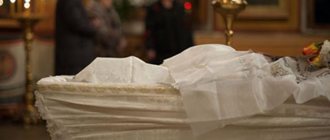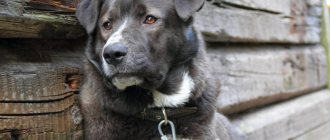Just recently I met an old friend of mine who had spent her entire life breeding certain breeds of dogs and selling puppies for very decent money. This is how the woman lived until she began going to church, helping at services, and became completely immersed in the life of the Orthodox Church.
The problems arose by chance, the priest found out that she lives in an apartment with a dog, and the dog literally sleeps on the bed with her. He urgently asked to give up the dog and consecrate the apartment.
This reaction at first confused my friend, but after receiving an explanation, she without hesitation got rid of the animal, giving it to her relatives, and continued serving in the temple with a clear conscience.
Why is Orthodoxy against keeping dogs in the house?
Today's pet boom is driving many people crazy. Cats and dogs are considered almost like family members. This, according to church ministers, is wrong.
Let's try to understand why true Christians interpret a dog as an “unclean” animal, why after a dog was in the house, it certainly had to be illuminated.
If we turn to the Bible, we will see how this burning question is interpreted in relation to this animal. Deuteronomy says, “You shall not bring the wages of a harlot or the price of a dog into the house of the Lord your God by any vow, for both are an abomination to the Lord your God.”
By the way, exactly the same opinion exists in Islam; there, too, dogs are not allowed into people’s homes, being considered a desecrated animal.
Contemporary attitudes of faith towards animals
Today the world has changed. Many parishioners keep dogs at home. The opinion of the priests is that one must live in harmony with all the creations of the Lord, no matter what position they occupy on the hierarchical ladder. All animals are good, there is no threat of creating idols out of them. Therefore, there are no grounds for “discrimination” against four-legged friends. In addition, there are now many small breeds of pets that are easy to keep in an apartment.
Today the church says that by nature all animals are good. Yes, it is forbidden to take them to church, but due to specific characteristics (anxiety, smell). But there is no talk of desecrating a house of worship.
Note! The problems of our time should not be blamed on dogs, but on a sinful lifestyle. A pet is not an obstacle to the consecration of people’s homes.
Buddhist and dog
What does the Bible say about this?
Let's look again at the Bible, where the word "dog" and the word "dogs" are mentioned about 25 times. In the Ancient East and the Bible, the dog is associated with poverty, deprivation and suffering. It is worth paying attention to such passages as “Thou shalt not bring the price of a dog into the house of the Lord,” “Thou shalt not give holy things to dogs.”
Here we clearly see a negative attitude towards four-legged pets in terms of their uncleanliness. It is forbidden to bring into the temple money intended for donation, which came from the sale of dogs or was earned by prostitution.
According to Blessed Pelageya of Ryazan, if a dog lives in a house, the grace of the Holy Spirit leaves it. Moreover, if this animal lives in a house that has icons, the owner of this home is not allowed to receive communion.
Another example from the life of one elder, whose name is Alexy Penza: once an old familiar priest came to visit him and took his sons with him. The elder immediately sensed and foresaw that one of his sons had a dog living in his house.
He strongly recommended not to keep it in his apartment in the future, and to subsequently consecrate it. He repeatedly noted that a dog's life is intended for protective actions, so its place is near the house, and not near the bed on which a person is reclining.
Saints' opinions on their treatment of animals
The number of people in the world who are compassionate towards animals exceeds those who reject them. But many do not join the church for the reason that it considers the “lesser brothers” not worthy of attention.
This is fundamentally wrong - in Orthodoxy there is no teaching about animals at all. There is only the private opinion of individual priests, in which the attitude of the Orthodox Church towards dogs is visible.
Thus, some argue that the souls of animals disintegrate at the moment of death. Others argue that God's creatures were created and lived in paradise before Adam and Eve. And everything that existed before the fall of people is imperishable. This means that the souls of animals are immortal because they are from the Holy Spirit. However, as St. Luke asserts, immortality for an animal is not as significant as for a person, because the primitive spirit cannot develop and improve.
Orthodox saints show how to treat animals. Seraphim of Sarov fed the animals near his dugout and shared bread with them. Sergius of Radonezh healed a blind bear cub with prayer. Gerasim of Jordan helped the lion when a splinter stuck in his paw. Leo served him and died at the saint’s grave.
Feeding and caring for creatures, saving homeless kittens and puppies is not a sin. But you can't worship. Love must reign among all God's creatures.
What are the consequences of having a dog in your home?
According to Orthodox Christians, evil spirits can easily enter a house where a dog lives, which is why cases of dogs attacking their own owners often occur. The dogs do not spare either adults or children. There have been repeated cases of such brutal attacks.
Of course, every creature has the right to life, but every creature has its own place on earth, allotted by God. Animals must serve man; this is why the Creator created them. A dog occupies a strong place in a person’s life, but its place is next to the home, and its purpose is to protect this very home.
There is no more loyal friend and guard than a dog; it protects its owner and serves him faithfully. In the North, it is extremely difficult to live without dogs; they are both the main means of transport and play a vital role in the economy. These animals have many roles, but we must not forget where their place should be.
No one is saying that dogs should be thrown out onto the street and left without care, as many cruel people do. If you have an animal, you must be fully responsible for it, its life and health. But, if you go to church and pray to the holy Image, there should not be an “unclean” animal in your house.
Let it live in the yard, for this you can build an enclosure or a booth where the dog will fulfill its main mission, guard and protect your home.
Why do Orthodox Christians consider a dog an unclean animal?
Let us deal with the question of the purity of this animal with the help of the Holy Letter. In the Old Testament, animals are divided into clean and unclean. Clean animals are those that could be eaten. And the unclean, accordingly, are those that could not be consumed. Dogs are unclean. This is explained by the fact that the Israelites were held captive by the Egyptians for a very long time.
They, in turn, had too many different gods and idols to worship. One of these idols was a dog. Therefore, in order to save the people from the temptation to worship dogs after the Egyptians, Moses included this animal in the list of unclean ones. But all this was done solely to protect people from sin. In the New Testament, this division of animals is abolished. The Lord says that He has cleansed, then let no one consider it unclean, because there are no more divisions.
In the modern world, the issue of keeping a dog in the house is very relevant. If previously a dog lived without question on the street, in a barn, in a kennel, in an enclosure, now there are even breeds of small dogs that cannot be left on the street. Once upon a time, dogs performed the function of a protector, a security guard, but now they can also be just friends who help brighten up people’s loneliness. In cities, dogs are often kept in apartments for this very purpose.
Why killing animals and people is not the same thing
In the Christian understanding, man is above the whole cosmos. Whatever Darwin's theory says, humans have a special, unique status in this world.
God created only man “with His breath” (“And the Lord God created man from the dust of the ground, and breathed into his nostrils the breath of life” Gen. 2-7), in His own image and likeness (“And God created man in His own image, in in the image of God he created him; male and female he created them" Gen. 1-27).
More texts from the Bible:
- Gospel of John, chapter 15
- Epistle to the Galatians by the Apostle Paul
Man is not part of the Universe; rather, it is the cosmos that is part of man. Our bodies are from the world of matter, and our souls and spirit are from God Himself. Animals are just creatures of the earth. The Bible says: “And God said, Let the earth produce living creatures after their kinds, cattle and creeping things and wild beasts of the earth after their kinds. And it was so” (Gen. 1-24).
Therefore, the Church does not prohibit eating meat and allows hunting and animal husbandry.
Attention! But as for pets, a person is responsible to them, since he took them into his home and allowed them to become attached to him. He is obliged to take care of their lives and well-being. Video about euthanasia for animals. Answered by Maxim Kaskun
Scientists' opinions
However, scientists associate hatred of dogs not with religion at all, but with historical facts and everyday life. Thus, historians see the roots of the negative attitude towards dogs on the part of Muslims in the conflict that occurred in ancient times between supporters of Islam and Zoroastrians. As is known, among the latter the dog was considered a sacred animal. Muslims did not want to have anything to do with fire worshipers, so they declared dogs “nasty.”
The Egyptians, who enslaved the Jews, also had great respect for dogs. According to historians, it was for this reason that the Jews disliked the entire dog race.
As for Christianity, the usual rules of etiquette and hygiene prevail here. It is clear that a dog does not always avoid puddles, so if you let it into a house or temple, cleaning will not be avoided. In addition, a dog can easily swallow something dirty and become a carrier of the disease. Apparently, the experience of such infections, accumulated over centuries, formed the basis for ideas about the “uncleanness” of a given animal.
How is the Sacrament of Marriage performed?
Photo: Elitsy.ru
The ritual consists of three parts:
- engagement;
- wedding;
- common bowl.
Before the betrothal begins, the priest is obliged to ask the groom whether he takes the girl as his wife of his own free will, and whether he has previously promised to marry someone else. A similar question is addressed to the bride.
The newlyweds bring rings with them to the temple. The priest blesses them at the altar. This is a symbol of love and fidelity. A white towel is laid under the feet of the newlyweds. It symbolizes the pure and faithful relationship between lovers in a family.
Photo: Moscmc.ru
Then the bride and groom put rings on each other. This tradition came to Christianity from Ancient Rome. It symbolizes that a person gives himself to another into voluntary slavery. After this, the husband and wife are considered to belong not to themselves, but to their spouse.
The priest says special prayers dedicated to prosperity, peace in the family, love between spouses. He asks the Almighty to grant the married couple a long life and healthy children.
Photo: Blago-kavkaz.ru
Next, the priest blesses the bride and groom with crowns. They imply a reward that is due to believers for leading a chaste life before marriage. The Holy Scripture and the Apostle are read, as well as the prayer “Our Father.”
A cup filled with wine is brought out, from which the bride and groom must drink. This is a kind of symbol of future trials and difficulties that a husband and wife must endure together. Everything that happens during a wedding strongly resembles agape, which is the name of the ancient supper of love.
Photo: Eparhia.ter12.ru
Next, the spouses follow the priest, holding each other’s hands. To the singing of the troparion “Isaiah rejoice,” they walk around the lectern. In some cases, they are followed by witnesses who continue to hold the crowns above their heads.
If the wedding is repeated, for example, when the husband or wife from the first marriage has died, there is no betrothal. If spouses who have previously lived a long life together in a state-registered marriage are getting married, a prayer of repentance is added to the rite, and the prayer for the gift of children to the couple is also excluded.
The Orthodox Church believes that after the Sacrament of Marriage, husband and wife become one flesh.
About the “devilish” mice and the “cat” monastery
One of the last Optina elders named Nektary, who died in 1928, told a legend according to which a cat saved Noah’s Ark during the Great Flood by gobbling up a mouse, which, at the instigation of the devil, was trying to gnaw a hole in the bottom.
There is a legend about Saint Helen Equal to the Apostles, mother of Emperor Constantine the Great, whose ship once landed on the island of Cyprus, where the empress learned that the inhabitants of the island were suffering terribly from an invasion of snakes.
We advise you to study the Prayers before the Feodorovskaya Icon of the Mother of God
To help them, the Empress ordered a thousand cats to be brought to the island from Egypt, and soon the snakes were done away with, and Helen founded the St. Nicholas Monastery on the Akrotiri peninsula, in which the monks took care of many cats. This “cat” monastery existed until the 16th century, when part of Cyprus was captured by the Turks. Now the monastery is being revived, however, instead of a men's monastery, they made a women's monastery here, but cats still live in it.
There is also a completely everyday justification for the fact that cats are even allowed into the altar - they hunt mice and do not allow them to gnaw on prosphora and wax candles, that is, they bring specific benefits to the temple and thereby serve God. And on Holy Mount Athos they also perform their service - they catch snakes.
Sample
The Lord asks us to be laconic in our prayer requests: “Do not say too much when you pray...” (Matthew chapter 6)
When the apostles asked Christ to teach them the correct prayer, He gave them the “Our Father.” Despite all its simplicity and brevity, it contains everything that needs to be asked of God. In the lines “our daily bread” one should understand food in general, in “deliver from the evil one” - a request to preserve from all evil, conflicts, quarrels, attacks and temptations.
St. John Chrysostom argued that the “Our Father” is a model of prayer and that God is pleased not with an abundance of words, but with the vigilance of the soul. Based on this prayer, it is not forbidden to pray in your own words. As St. said Basil the Great, the order of prayers should be as follows:
- Glorifying God;
- Thanksgiving for all God's blessings;
- Confession of your sins;
- Asking for what is good for oneself, but most of all what is necessary for the salvation of the soul.
LiveInternetLiveInternet
Quote from Affectionate_Flock
Read in full In your quotation book or community!
Dogs and the Church.
You can often hear that keeping dogs in an apartment is a sin. And here is what His Holiness Patriarch Kirill says about this:
Comment by Metropolitan Kirill of Smolensk and Kaliningrad on the question of whether a dog is really an unclean animal: “I treat animals well and love dogs very much. I have three dogs in Moscow and two in Smolensk. The Church has never considered dogs unclean animals and has never forbidden them to enter premises. Many people are against allowing a dog to enter a church, but not for theological reasons, but for reasons of a purely traditional, historical nature, rooted, as it seems to me, in ideas about hygiene. […..] I want to say that the ban on dogs entering the temple is not fixed in canon law. This is simply part of the tradition, and the same tradition probably extends to horses, piglets, chickens, geese and other animals. But does not apply to cats. Why? Yes, because they always caught mice. And cats were allowed into the temple precisely for this purpose. Moreover, a cat is a very clean, almost sterile creature, domestic in the full sense of the word. It does not create hygiene problems for the space in which it is located. I think that the problem lies only in this, and there is no mysticism associated with dogs, and even more so there is no “anti-dog” theology. We must love animals, because by showing love to animals, we train our human emotions and become more humane.”
Archpriest Maxim KOZLOV, rector of the Church of St. mts. Tatiana at Moscow State University:
“Dogs are very good animals, and they, like all animals, were created by God, so every person can keep any number of dogs at home, as long as it does not become a passion for him. But there are cases when priests refuse to bless apartments because of dogs. And sometimes you can come across the opinion that a dog is a “bad” animal, and it can be possessed by a demon. It must be said that such statements are of a personal nature, that is, they were never dogmatized by the Church. From the point of view of Orthodox theology, a dog is no better and no worse than a cat. Most likely, the cat was allowed into the house and temple only because there were mice there. For example, a Russian preacher lived in India after emigrating. He was a priest, and while living in a foreign land, he built himself a temple. He built it specifically on some sacred pagan mountain so that no one would disturb it. One day, entering the temple, he saw a cobra sleeping on the throne. Then he calmly took it and threw it away. What to take from an animal, it doesn’t know what a throne is. But if you follow the existing opinion, then the cobra is the most terrible beast, and did the priest even have to leave immediately? He didn’t even re-consecrate anything. The same attitude should be towards dogs. No creature can drive God out either from our apartment or from the temple. But how many times have dogs saved people? Take, for example, the memoirs of Metropolitan Nestor - “My Kamchatka”. He describes many cases when these animals helped by warming them up, pulling them out of the water, and leading them out of the tundra. Many northern peoples live with dogs in yurts, but at the same time they do not cease to be people. They treat dogs like family members. It’s simply not possible there otherwise. Surely Bishop Nestor consecrated these dwellings and prayed with these people. "
I think few people are also aware that the late Patriarch Alexy II
there were 3 dogs and, according to eyewitnesses, he loved them very much.
Love here, of course, does not mean passionate love, when the animal is humanized and placed at the forefront, but sincere love for God’s creation. “I have always loved animals. Dogs have accompanied me throughout my life,” said the Patriarch. “After you tinker with them, your heart becomes light and at peace.” At home I had a dog named Chizhik, who recently died. Now there are three left. Kesha is a pug. Fluff - Pekingese. And some time ago, when I met the children of Beslan, they, you know, gave me a dwarf poodle. At first I was confused, I even said: “Will they let me go home with him?” Especially keeping in mind Fluffy's proud, independent character. But Tusya (the poodle turned out to be a girl) won everyone over with her cute, funny face.” “His Holiness did not pass by a single animal,” recalls the abbess of the Pyukhtitsa convent, Mother Varvara
.
- Loved them very much. And now they yearn for him...” The answer of the famous Theologian Deacon Andrei Kuraev
to the question “Is it true that a dog should not be allowed into the house?”
- This is one of the most widespread parish gossip
.
Like, “if a house is sanctified, the Lord takes up residence, and if a dog is allowed into the house, the grace of the Holy Spirit leaves!” Anyone who has dogs living in the same room with icons should not be allowed to receive Communion!” But there are no theological grounds for such a categorical opinion. The Bible does not teach that dogs and grace are incompatible. When the Angel Raphael accompanied Tobiah, “and the young man’s dog was walking with them” (Tov. 5:17). And this did not drive Angel away or bother him. And nowhere in the Bible is a dog referred to as an unclean animal (just as a cat is nowhere referred to as a clean animal. Church history allows us to say a word in defense of dogs: in 1439, a council was held in Florence that concluded a union between Catholics and Orthodox Christians. On the last day of the council, when and the act of union itself was read out, a dog was lying at the feet of the Byzantine (Orthodox) emperor. And when they began to read this document, which from the point of view of Orthodoxy was treacherous, the dog barked so that no one could stop him. By the way, this happened in temple. And the dog was the only one on that day and in that place who raised his voice in defense of Orthodoxy... Hostility towards the dog is not of ecclesiastical, but of pagan origin. “The dog, for an unclear reason, is common in the semantic series death-underworld-Earth.” Mystical The reasons for the negative attitude of some pagans towards dogs are unclear, but the everyday reasons are quite clear: a dog smells like a dog, and when in heat, unlike cats, crumbs do not lick themselves and leave marks. Dogs calmly lie down in the mud and can go crazy (and then devour their puppies). But in the end, none of this is inevitable. Yes, in a traditional household, the places of animals were distributed reasonably and clearly: the dog guards the house from the outside, the cat from the inside. But our apartments do not have “garden plots”. So the dog has to be allowed inside. And the benefits of having a dog in a modern home are quite obvious. Today, the pet dog has become a means to a completely Christian upbringing of children
.
“Did you ask for a puppy? So take care of him and go for a walk with him!” The harm from driving out a dog “in the name of faith” is just as obvious. If a grandmother, determined to fight a dog with some kind of “spiritual mentor,” comes home and, taking advantage of the absence of her children and grandchildren from home, drives out their beloved puppy, then what will her children and grandchildren think about the faith of the grandmother herself, about that “mentor” “What instilled this wisdom in her, and about Orthodoxy in general? For a modern city dweller, communication with an animal is, first of all, a school of love and care. Naturally, if there are “too few children” in the house, then they themselves go through the experience of coexistence and caring for each other, although at times they beat each other up. Unfortunately, in modern families there are very few children and very often animals act as surrogates for children. This is probably bad. It’s bad when adults get an animal instead of
a child, but if the child himself asks: “Mom give me a brother or a puppy,” and the mother gives him a puppy, then this is good for him.
It would be better if there was a brother, but a puppy is better than nothing. In this case, you need to explain to him: “Look, there is a living creature next to you for which you are responsible. Whether you like it or not, you go for a walk with him, look after him, think about him, get sick with him.” Then this will be the first school of affection and the first school of loving care. First it is an animal, then it will be friends. Little by little a person will go through such a school of love and, perhaps, learn to love God. This article can be continued for a very long time.
Both on the Internet and in Orthodox literature there are a huge number of statements by both high Church officials and ordinary priests in defense of dogs. Listing them all means creating a separate resource dedicated exclusively to this topic. However, another interview is still being posted due to the answers to the simplest everyday questions related to keeping dogs in the house.
Materials from Elena Tipikina, PR Manager of KPC ATAMAN LLC.
It would be nice to start with the traditional introduction - “the editorial office received a call...” But the call did not come.
Neither to the editorial office, nor to my apartment. But there was a reproach. As they say, “in a warm, friendly atmosphere.” Simply put, one of my friends, who has dogs and cats, seriously “ran into” me in the midst of a feast. This friend of mine (we will keep silent about her name) knows about the nature of my work*, and suggests that it is I, as an adept of the Russian Orthodox Church, who is the most suitable object for redressing the grievances inflicted on her by the “clergy.” The insult inflicted on her cannot be considered a joke. One of the priests serving in the St. Petersburg church (we will also keep silent about his name) refused to consecrate her apartment under the pretext that it was desecrated by the residence of “unclean animals,” that is, dogs. And moreover, he did not limit himself to refusal, but, frightening and frightening with heavenly punishments, he strongly recommended that she expel “this disgusting thing” from the house. While I sincerely sympathize with my friend, an accidental victim of religious extremism, I still have to admit: there is a problem. Historical, ethnographic and partly social. It's a rare provincial old church woman who won't turn pale when she sees a dog's face at the church doors. Just like a rare Muslim child will not throw a stone at a mongrel that accidentally ran into an Arab courtyard. The easiest way to piss off an Orthodox Jew in a Jerusalem neighborhood is to call him a dog. Why do religious orthodox* people of different faiths spit after the dog? What did she do wrong before God and humanity? This question is very pressing for me - I am a believer. Having my own opinion on this issue, supported by knowledge of church rules and regulations, I, “without hesitation” *, have a dog in a city apartment. What should “those of little faith” do, who are confused by ignorance of Russian church traditions and rules? For clarification, I turned to two priests of the Russian Orthodox Church (ROC) - Father Vladislav Redin and Father Gennady Korshun
.
I had a long-distance telephone conversation with the first one, and I came to the second one with a voice recorder. Father Vladislav is a priest with an academic education, a seminary teacher in one of the Russian cities. I know Father Vladislav through the nature of my work. He himself not only has a dog, but also a riding horse, on which his daughter competes. The dog is a “childish” Labrador, attends exhibitions, and is a family favorite. Father Gennady does not keep dogs in the house (he has a cat) and adheres to fairly strict rules for keeping them. But it was he, Father Gennady, who blessed our apartment and country house, not embarrassed by the presence of two Giant Schnauzers. In the text I will address one or the other priest alternately; I asked them almost the same questions. — Father Vladislav, explain why the church calls a dog an “unclean” animal? Many people have literal associations with “evil spirits”... O.V.
: The tradition is ancient, of Old Testament origin.
The three world religions - Christianity, Judaism and Islam - have origins that go back to common historical roots - the Old Testament. For us Christians, the Old Testament is an integral part of the Bible that precedes the New Testament - the main Christian law and textbook. Nevertheless, a significant part of the traditions and rules migrated to Christians precisely from the Old Testament. Several thousand years ago, the Lord commanded people through the greatest prophet Moses to divide domestic animals into “clean” and “unclean”. For those consumed as food and destined for burnt offerings. And those that were forbidden to eat or sacrifice to God, to bring to the altar. So associations with “evil spirits” today are very superficial. Clean animals in the Old Testament rules - lambs (lambs), calves (calves), pigeons - when sacrificing them had to be male and not have physical defects or deformities. They had to be “blameless.” Modern Judaism firmly adheres to the Old Testament rules set out in a special book - the Talmud. By the way, the remarkably tasty and widely consumed fish in Russia, catfish and sturgeon, are also “unclean” animals. The Talmud prohibits those professing Judaism from eating fish that do not have scales. So whether a beast is “clean” or “unclean” is today rather a matter of gastronomic preferences. Now about history... For the Old Testament Jews, the dog was really an animal symbolizing unbelief and lawlessness. The historical enslavers of the Jewish people, the Babylonians, who repeatedly burned Palestine to the ground, professed the Zoroastrian pagan religion, in which the dog, as a deified animal, was given a particularly honorable place. So the dog for the Jews was a hated pagan symbol. It was not only the ancient Jews who called a pagan a dog. “Stinking dog”, “unbaptized dog” are traditional Russian curses addressed to the Polovtsian and Mongolian hordes, and to the Teutonic knights. Many Old Testament laws exist in Christianity as moral rules: the Ten Commandments, for example. Or the pious tradition of covering a woman’s head (a mandatory rule when entering a church - editor’s note). But the Orthodox Church at the legislative level does not divide animals into “clean” and “unclean”! There is not a single council decree prohibiting Christians from having a dog. It also needs to be said that a domestic dog in the 21st century, especially a city dog raised and selected by man, has nothing in common with the ancient hordes of feral and ferocious dogs that besieged cities. Dogs huddled in packs, hungry, sick with scab and rabies, struck terror into people. There was a form of execution - “throw to be torn to pieces by dogs.” To drive a guilty person out of the city gates at night meant dooming him, if not to be eaten, then certainly to the torment of horror. Not to mention the fact that they learned to cure rabies less than a hundred years ago. —Can a demon possess a dog? O.V
.: Having driven out hordes of demons from a possessed man on the Gadarene rock*, the Lord Jesus Christ sent them into a herd of pigs.
And the pigs, enraged, rushed off the cliff into the sea. And they drowned in it. Animals are undoubtedly animate beings. And apparently, like people, they can be susceptible to mental illness. There are any number of examples of bad, indomitable temperament - that’s what they say: the dog rushed like mad, the horse went mad and bolted... People should cultivate the character of domestic animals through selection and education. In Christian literature and legends there are any number of examples of holy ascetics taming ferocious animals: the prophet Daniel, thrown into a ditch to be devoured by hungry lions, was not eaten by them. On the contrary, the lions meekly lay down next to him. The Holy Reverend Seraphim of Sarov fed bread to a wild bear who came to him in the desert* for handouts; Elder Gerasim carried water in wineskins in the desert on a wild lion, which voluntarily served the elder. Undoubtedly, a kind, meek-hearted person will raise a good animal. Evil, unrestrained - will raise an animal with the same disposition. Look how many owners boast that their dog is a terror in the neighborhood, chewing other dogs, crushing cats, biting people. This is a real cultivated rabies. Not in the sense of a viral disease, but in the sense of obsession. God created the dog to serve man. A person is a dog owner, a legal entity, not only responsible before the law for the actions of his animal, but also before God for indulging his passions - pride, anger, vanity. O.G
.: The fact that “evil spirits” possess a dog is most likely a fiction.
But here's what I noticed: dogs very often look like their owners. To such an extent that sometimes a dog has a “face”, and sometimes vice versa - a person’s face becomes an angry muzzle. A dog serves a person and in some ways copies him. A “mad” dog is a product of the upbringing of a “mad” owner. - Can I, the owner of a dog, pray to God to grant her health or to find her lost dog? Or is this blasphemous and unacceptable? O.G
.: In our missals* there are texts of prayers for suffering animals.
Praying for them is a legitimate thing. If trouble happens - an animal gets sick, gets lost - turn to God. But turn with contrition and repentance. Think about it, why is the Lord demanding from you? But it will be blasphemous if you, calling the dog by a human name, order personalized prayer services, etc. You cannot submit a note about the health of the dog Druzhka. You will confuse and most likely disturb the peace of both the parishioners and the priest, even if you do this out of ignorance and do not have blasphemous thoughts. Such prayer can be secret or purely domestic. O.V
.: Everything bad that happens to a person happens by God’s permission.
If something happened to your dog, think about why? Maybe you were giving to her what you should have given to people? Maybe you are “fixated” on your “dear and only” and at the same time hate all of humanity? Have you forgotten the main thing? About the fact that the Lord commanded to love God and neighbor? Dogs need to be given some of your warmth, mercy, and affection, but maybe you mistakenly believe that your “neighbors” are only your dogs? Or does the dog bring out the worst qualities in you? Self-interest, envy, vanity... Then don’t be surprised that your dogs are “dying like flies.” And before you pray for a dog, think about what else you ask God for? If only about your beloved dog, then this is blasphemous. But if you go to a competition or service with your dog, then, of course, it will be better if, instead of superstitiously spitting over your left shoulder and wishing “no feathers,” ask for God’s blessing. Dog breeders are often superstitious people: they tie colored strings to their dogs “from the evil eye”, do not go to exhibitions on the 13th... A good deed should begin with a short prayer - “Lord, bless.” Often people believe in demonism, the evil eye, and so on, but forget that without God's permission nothing happens. It turns out that we believe in the devil, but not in God. — Is it true that a temple is re-consecrated if a dog runs in? O.V.
Not true.
This is a prejudice. The charter says that the temple will be desecrated if a wife* or an animal gives birth in the altar. By the way, women of childbearing age are prohibited from entering the altar, although older nuns can obtain this right. It’s hard for me to imagine a situation where a dog can whelp in an altar. In this case, the temple is consecrated anew. I've never heard of this. It often happens that a church is sprinkled with holy water when cows or dogs wander into it. This pious tradition exists more to reassure suspicious parishioners. — Are there rules regulating the keeping of dogs? O.V.
At your request, I turned to primary sources: collections of rules, typicon*, conciliar decrees.
One thing I was able to find is that Christians are prohibited from eating food with their dog at the same table and from the same dishes. — Father Vladislav, was your dog at the exhibition? O.V
.: Yes, my daughter drove it and received something so important... some kind of title.
Happiness knew no bounds! But I immediately flicked her on the nose - don’t be proud, don’t be vain. — Is it possible to visit exhibitions during church fasts and holidays? O.V.
: The question is not clear-cut.
For my daughter, there is a rule: if you want to visit the exhibition on Sunday, get up early and first “give to God what is God’s.” She goes to early service at 6 a.m. and then to the exhibition. I think this can be good practice for believers. As for the posts... I remember. how an international exhibition was held in our city on the twelfth* feast of the Dormition of the Mother of God. And this shocked me... The entire Orthodox world is mourning the death of the Mother of God, the rite of burial is being performed, and at the same time there is an exhibition, a “party”. Surely they drink champagne, shout “hurray”... Of course, not many people know about this holiday, but the organizers could have respected traditions, scheduled the exhibition for another day and not lead people into sin. Exhibitions are a zootechnical event; without them there can be no dog breeding as an industry. But for many owners, the exhibition is an end in itself, a vanity fair. At exhibitions, people behave very differently: some are businesslike, calm; Others - like hysteria, give free rein to passions, sob, go crazy, go into rage, insult judges and each other. I think that this, last, dog breeding is contraindicated. O. G
.: We are working on posts at our work.
No one goes into the “deaf shutter”, living in the world. For some, the exhibition is also a job. And for those to whom this entertainment, I would give advice: if you come, behave more modest. On great church holidays - Christmas, Easter, to visit the "Ristales" is sinful. - As an amateur, I am ready to try to “rehabilitate” the dog in the eyes of the church, but my arguments warm my soul only to the same amateurs as me. Most of the "church grandmothers" do not want to listen to me. Neither hunting dogs are depicted in Kyiv on the frescoes (in the scene of the hunting of the Holy Prince Vladimir), nor that the canonized royal family had loving dogs. Not the fact that my great -grandfather, a priest, shot in 1937, had dogs and loved them. My grandmother still remembers how their dog Hector in the terrible hunger of 1921 literally saved the children from the hunger of the hunger when the ice cream of goose was dragged into the house stolen in a military convoy. Therefore, I ask you very much to say a laudable word to the dog, or at least a word in her protection. O.V.:
The dog did not guess in anything in front of humanity.
People are guilty of her bad reputation. O. G
.: Dogs and other pets serve a person.
Dogs are guard, military, someone protects the yard, someone is looking for the wounded, someone serves on the border. Animals are our captives, we must take care of them. I am conservative and I think that to have a dog in an apartment impractical and non -hygienic. The dog should live in the courtyard of the house, where cattle are bird. But I will consecrate an apartment at the request of the owners, even if a dog lives there with people. - Is there a dog in your opinion, in your opinion? O. G
.: Scripture suggests that animals have a soul.
But what is the fate of this "bestial" soul - we do not know. Scripture does not answer this question and even directly indicates that people are not given to know this. But in the apocrypha there are descriptions of paradise animals and birds of rare beauty. Maybe these are the souls of our earthly animals? Those that serve us on Earth today? - Grace retreats from the "smell of dog"? O.G
.: The spirit of God breathes, even likes it*... How do we, earthly, insignificant people dare to talk about whether the Lord is afraid of the dog?
These are purely human fabrications. Not the “smell of dogs” is disgusting to God, but the spirit of self -interest, profit, and malice. - Father Gennady, a question for you personally. If the team of rescuers of the Ministry of Emergencies or a riot police detachment with dogs will ask you to serve a prayer service when sending to the service place, do you serve it? Is it possible to serve a prayer to a detachment of conductors with dogs? O. G
.: The presence of animals near people will not serve as an obstacle.
You can’t enter the temple for dogs, but a prayer on the street, at the station, of course, I will serve. After all, we pray for a successful outcome of a good deed, and a dog is only an instrument in the hands of a person. - What to do to a person who has encountered the priests of his passion for dog breeding with rejection? O. G.:
Every priest is a person. There are no angels among the priesthood on Earth. Therefore, first of all, not to be offended by weakness or misunderstanding of the priests. Do not imagine that the “Pop Ivan” is the final instance of the Church. Just go to another priest, and a misunderstanding to regret, regret his weakness. Try to find understanding in another temple. And think about yourself, your sins, without condemning anyone. https://www.dresdog.ru/articles/26











